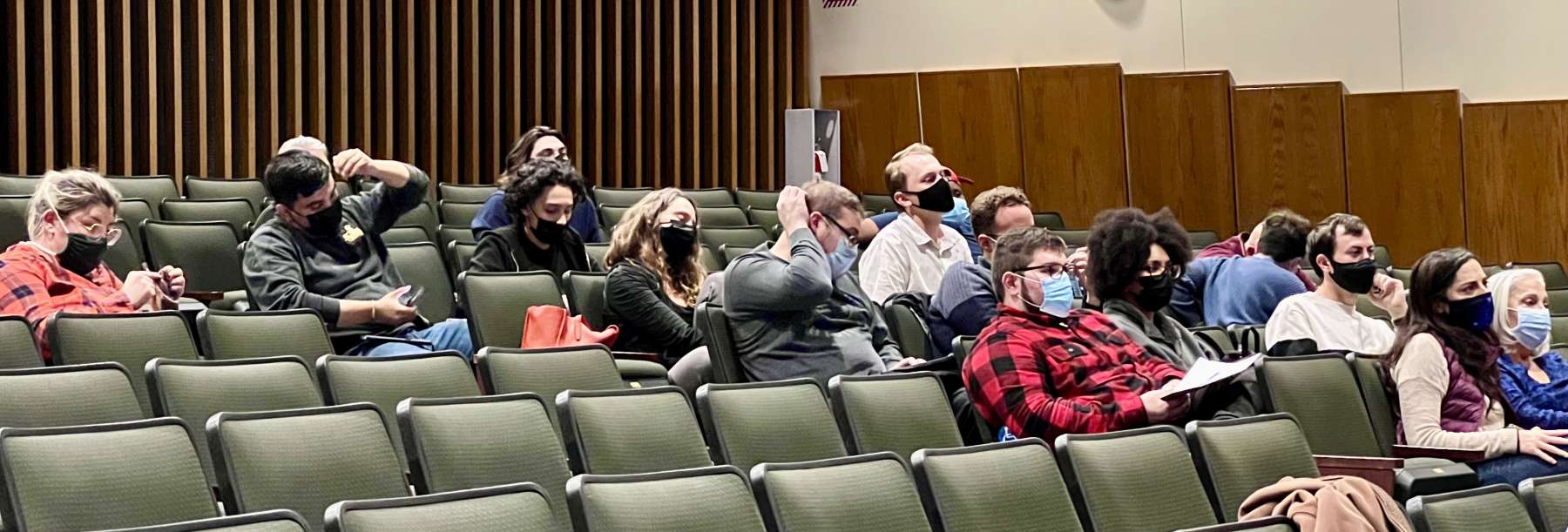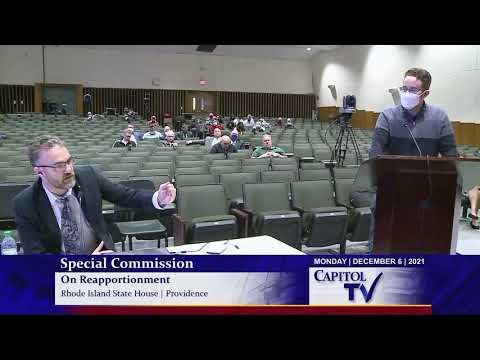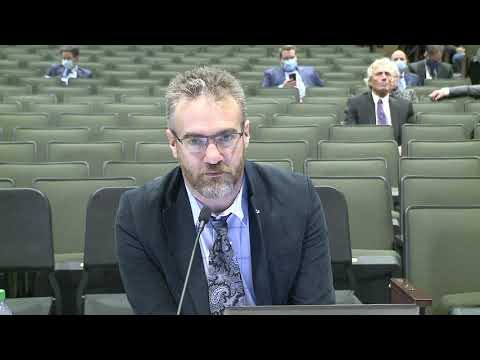Rhode Island redistricting appears to intentionally protect incumbents
“… it’s certainly an instance where we were cognizant of where people were and it’s a question of can we accommodate everybody,” said Kimball Brace of Election Data Services. “One of the standards you have to recognize is that a redistricting process is ultimately a bill that needs to be passed in the legislature, right? So you need to get 50% plus one vote of the legislature to get the bill passed.”
December 7, 2021, 2:03 pm
By Steve Ahlquist
When Rhode Island’s Redistricting consultant Kimball Brace introduced his first draft of House and Senate district maps to the Rhode Island Redistricting Commission last Thursday, UpriseRI was struck by the fact that not one sitting member of the General Assembly had been redistricted out of their district. Given the number of legislators who live near the borders of their districts, and the large population shifts in the state, the odds seemed against such an outcome.
Over the weekend, it became apparent that many potential candidates who may have posed a challenge to incumbents found themselves outside their old districts, or, as in the case of Lenny Cioe in Senate District 4, had the neighborhoods that supported him the most cut out of the district. As Jackie Goldman testified at Monday night’s Redistricting Commission meeting in Smithfield, “It’s hard to look at the maps, as they stand right now, and think that they are agnostic as to what happened in 2020.”
Representative Brian Newberry, a Republican commission member, noted that two potential challengers to Representative Brandon Potter in Cranston have been drawn out of their previous districts. Representative Newberry suggested that passing such a a map “does not reflect well on this commission – even if it was an accident – I don’t think we should ever approve a map that does that… If we approve something like this it’s going to look like the heavy hand of the Speaker on the lever here.”
Others providing public testimony noted that progressive candidates such as Harrison Tuttle and Kinverly Dicupe found themselves outside their previous districts as well. Dicupe testified before the commission.
Though Election Data Services, the consulting company hired to create the redistricting maps, was not necessarily aware of the addresses of those who might challenge incumbents in future races, the consulting firm did in fact make sure that no incumbents were redistricted. They had a file with incumbent addresses, and, in putting together their maps, consulted with legislators about their districts.
This was done to avoid “disruptions” said Ryan Taylor of Election Data Services in speaking to the Redistricting Commission about potential changes to House and Senate Districts along the Pawtucket/East Providence border. “We’re going to do our best to avoid that disruption. It is hard for a sitting member to go into a new town as well as residents of that town to get used to a member who is not from that town.”
Uprise RI asked Ryan Taylor some clarifying questions after the hearing.
UpriseRI: If I heard you correctly, you said that you take into account political disruption…
Ryan Taylor: …as a last resort. Yes.
UpriseRI: Does that mean that you are aware of the addresses of people in office?
Ryan Taylor: Yes. That’s public record.
UpriseRI: I noticed that not one incumbent found themselves outside their district, even though some of them are awfully close to the border of their districts. I’m thinking in particular of Leonela Felix and Karen Alzate, who are in different districts, separated by a few streets.
So it’s not a coincidence that not one person found themselves outside their district when the maps were drawn?
Ryan Taylor: We’re trying to keep this a very smooth process. What we’re doing is getting feedback about the lines. At this point trying not have headlines about who might be not in favor. Putting two incumbents together is a headline. There’s all these headlines that come. We’re doing the best map we can. If I drew Justin Price in with Brian Kennedy, for example, that’s a headline. If I had drawn Karen Alzate and Leonela Felix together, that’s a headline. This experience is fraught with them. What I want is the single best feedback I can get and we’ve gotten it.
For instance, I’ve gotten a lot of feedback about the Mt. Hope neighborhood in Providence. There should probably not be three senators in one Providence neighborhood. I’m talking to Senator Mack and I’m going to follow her advice because she’s a resident of the neighborhood. That’s what I want the headlines to be. I’m trying to keep this as smooth as possible.
UpriseRI: Is factoring in where incumbents live a legitimate way to do redistricting?
Ryan Taylor: It’s not one of the top three considerations.
UpriseRI: I’ve never heard of that being part of any consideration.
Ryan Taylor: First is equal to equal populations. Second is the Voting Rights Act. One of the reasons for the Senate District 6 / Mt. Hope problem is the Voting Rights Act. I have to make some value judgements there. Mt. Hope is gentrifying. When I look at minority populations and racial populations I have a value decision to consider – with the help of its residents and its representatives. It takes local knowledge. I’m using that local knowledge as best I can. That’s the kind of values I’m looking at right now. Doing some possible scandalous move is gonna hurt that. So at this moment we’re not focused on unhelpful headlines.
UpriseRI: I talked to newly elected Senator Sam Zurier (District 3) and I asked him about the differences in his district. He said he doesn’t think he, the elected person, should be choosing his own voters.
Ryan Taylor: That’s right. That’s his value judgement, yeah.
UpriseRI: Zurier’s view feels like opposite of what this is – which is protecting incumbents…
Ryan Taylor: Remember we’re in the very first stages of the map. I reiterate that the fact there’s no paired incumbents is a headline and then the complete opposite, pairing incumbents, would have been a headline, probably with a lot more emotion behind it. I’m more interested in geography. I’m more interested in community. I’m more interested in the Mt. Hope dilemma. That’s where my values are. I love how Rhode Island is a state that does this a little differently. We don’t pit parties against each other. There’s a joint committee that just wants to do the best job they can, make this as smooth as possible and minimize disruptions. And that’s what I’m doing.
The next day Uprise RI called Kimball Brace, President of Election Data Services with more questions.
Kimball Brace: For the overall plan drawing process, it is quite normal to take into account incumbents’ home locations. That’s just one of the standard things that most states are involved with.
UpriseRI: Where does that fall on the order of operations? You have to start with equal populations and the Voting Rights Act, and then you have all the other things that were put into the enabling legislation by the General Assembly. But I don’t remember seeing, in the state legislation, anything about home addresses of incumbents. So is that like number four on the order of operations?
Kimball Brace: That’s generally considered to be part of what I call the kitchen sink, which is everything else that everybody is concerned about or looks towards. Incumbent location is commonly in that category and the courts have said that it’s a normal practice of redistricting. It’s not something that’s that’s notorious or anything like that.
UpriseRI: I’ve never heard of this being a criteria used when drawing maps, but I’m no expert here.
Kimball Brace: It is, depending upon the state. Sometimes it’s stated in state law or state practice and other times it’s not, but generally it is usually one of the factors that come into play in doing redistricting. There are some states that do specifically prohibit the location of incumbents from being known while doing redistricting. That is something that only a handful of states have prohibited.
UpriseRI: Is this something, when you’re being hired to take on the redistricting of a state, that comes up from the people who are hiring you?
Kimball Brace: It’s something that I’ve always talked about, whether or not it’s people hiring me or in public meetings. If you take a look at all the testimony I gave in the state of Michigan, which has a public citizens redistricting commission, I talked about incumbent locations at that point in time. But in Michigan that’s the one factor that is strictly prohibited in the way that they have written the language of commission.
UpriseRI: This wasn’t on my radar until I saw the maps last week. I realized as I was doing some quick checks that not one incumbent had been displaced from their home district. And I thought, what are the odds of that happening if it wasn’t intentional?
Kimball Brace: You have to keep in mind that districts are not the possessions of incumbents. They are something that are there – if indeed you can keep them there – as a recognizable area for constituents, that helps the continuation of policy and that sort of stuff. There are instances I’ve seen where people have gone out of their way to pair incumbents or do somebody in or something like that. That’s not what is taking place up here in Rhode Island.
UpriseRI: I don’t think that’s what happened. I’m thinking that what’s happening here in Rhode Island is that we’re protecting incumbents. It was phrased to me as we don’t want to make any headlines.
Kimball Brace: I don’t know if that’s necessarily the case but it’s certainly an instance where we were cognizant of where people were and it’s a question of can we accommodate everybody. One of the standards you have to recognize is that a redistricting process is ultimately a bill that needs to be passed in the legislature, right? So you need to get 50% plus one vote of the legislature to get the bill passed. That’s certainly the case in Rhode Island – not only in getting something passed from the commission, but then passed in the legislature.
UpriseRI: So being a legislator on the commission is like a guarantee of not being redistricted out of your district, right?
Kimball Brace: Not necessarily. What, what I would say is being on the commission gives you first look at what is happening.
UpriseRI: Right. But then, of course, you’re catering the redistricting maps to make sure that you can get a positive vote and no one is going to be outside their district. Otherwise that commission member or legislator might vote against it. And if it was a close vote, that person might be deciding vote, so you have to keep the people on the district committee in their districts.
Kimball Brace: Well, I would say that you need to be cognizant of all the factors. As part of the redistricting process, there are so many different factors that come into play it’s a question of balancing everything and incumbency location is probably one of those balancing acts.
UpriseRI: Was any consideration given to anybody who may have run against any of the incumbents in the past?
Kimball Brace: No, not really at all.
UpriseRI: So you don’t have any data on that?
Kimball Brace: We may not have even known where previous challengers had lived. We certainly didn’t get any information on that – we didn’t do any address matching of past challengers or anything like that. Now, I would think that a person that has run before and been challenged and was successful in their run would probably still remember where that person lived. You can’t do away with that memory on that side, but that’s not something that we were advised about or sought information about. [emphasis added]
[Uprise RI found this comment illuminating. Though Election Data Services does not knowingly take into account the home addresses of potential challengers to incumbents, it is possible that in consulting with each member of the legislature in private, on-on-one conversations, an incumbent legislator may factor in the location of potential challengers or in the case of Senate District 4, cut loose neighborhoods that don’t support them.]
UpriseRI: During the testimony last night, I think there were at least six different people who noted candidates challenging incumbents being redistricted out. For instance, Representative Brian Newberry, a commission member, mentioned District 16 in Cranston, where two potential challengers [one Republican, one Democrat] are no longer in the district to challenge Representative Brandon Potter. In the Senate President’s district, a potential challenger, Lenny Cioe, said that he wasn’t pushed out of his district, but voters who supported him were. At least three or four other people testified to the effect that they were candidates or knew candidates who were now outside the districts that they were intending to run in.
Kimball Brace: I listened to all of the testimony last night and I can say without doubt that none of that was taken into account, none of those were known. What happens in redistricting is that there’s many factors that come into play. The addresses of potential challengers to incumbents was not something that was on our radar. Whether or not it was on the incumbents minds – that may be, but that’s certainly not something that was shared with us. [emphasis added]
UpriseRI: So the only people who were protected in this redistricting were incumbents, who were level four priority in the order of operations…
Kimball Brace: I wouldn’t say level four priority. What you’re talking about is looking at all the different factors that come into play. And certainly knowing the address of an incumbent is probably one of those factors at some point in time, but it’s not level three or level two. I don’t think you can necessarily say it’s a priority in this fashion. That not an accurate depiction of what took place.
UpriseRI: It was in the kitchen sink then, level three. Like I said, the first level is equal population, the second level is the Voting Rights Act and number three is everything else in in the kitchen sink.
But not everything that’s in the kitchen sink category was enumerated at the redistricting commission meetings.
Kimball Brace: I think at some point in time – in the meetings – we talked about all sorts of different things that are part of the kitchen sink.
UpriseRI: Although we never talked about incumbency addresses being part of it until last night and even then it was obliquely referenced.
Kimball Brace: I don’t know that that’s necessarily the case.
UpriseRI: I’ve listened to all the meetings at least twice, and I never heard anything even remotely similar to that until last night.
Kimball Brace: Well, some of the parts of the kitchen sink have always been touched upon.
UpriseRI: It’s not written down anywhere. It’s not in the original legislation and it wasn’t stated in a public meeting before last night.
Kimball Brace: I think it was stated before. It may not have been one of the priority factors, but it is something that was known.
UpriseRI: Who was it known to?
Kimball Brace: Anybody involved with redistricting knows that that’s a factor. Anybody involved with redistricting knows that incumbency is one of the things that can be a factor, and the Supreme Court has said it’s an acceptable factor.
UpriseRI: I’m not worried about what is legally acceptable, I’m worried about what is morally acceptable to the people of Rhode Island, that’s where I’m coming from.
Kimball Brace: But the issue is not morality. It is what we have to take into account according to the law.
UpriseRI: Where does the law say you have to take incumbency to account?
Kimball Brace: It doesn’t say you have to or you don’t have to. It is something that is there, it’s a factor. It always has been a factor in redistricting, no matter where you are…
UpriseRI: Except for Michigan.
Kimball Brace: Well, Michigan passed a constitutional amendment that specifically had that language in it. A small number of jurisdictions that have that sort of law.
UpriseRI: Thank you very much for your time. I really appreciate it. It’s really helpful. Thank you.
Kimball Brace: No problem. Take care.
Here’s the full meeting:









